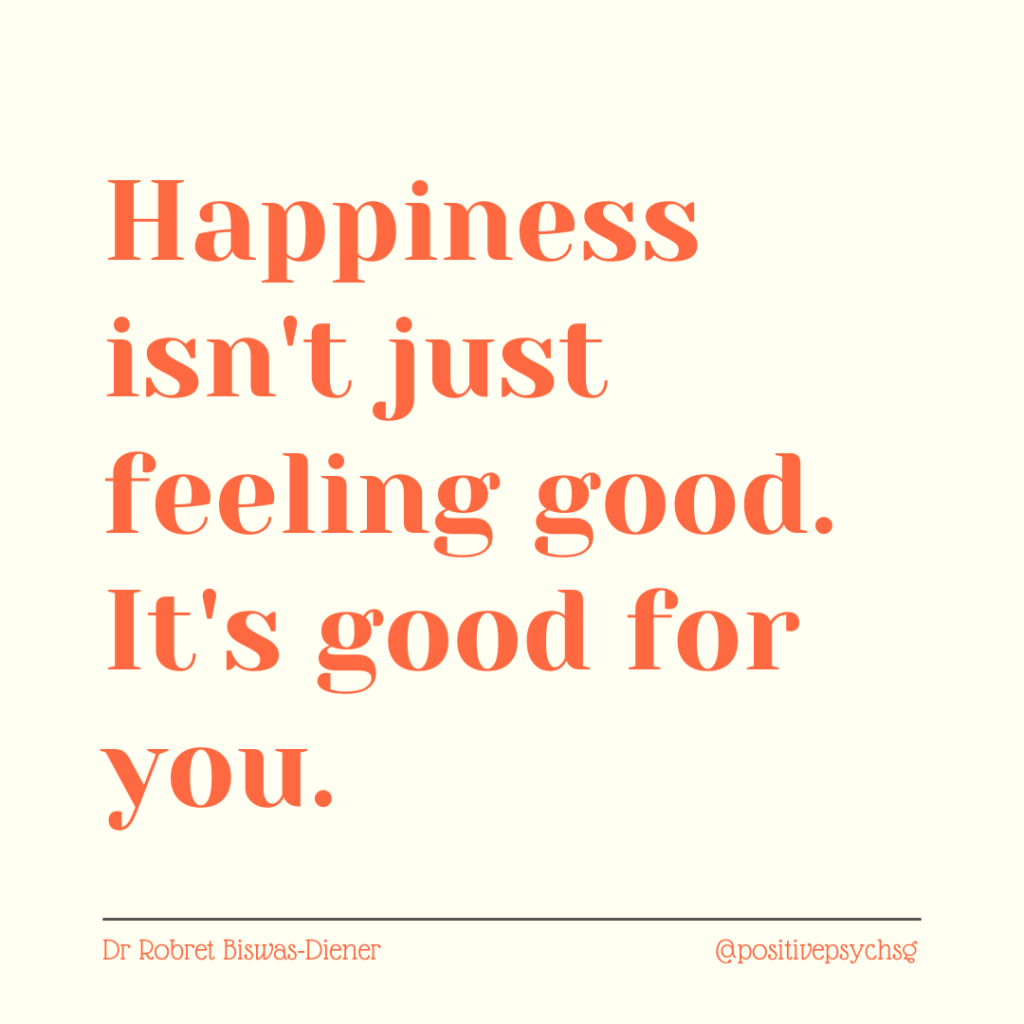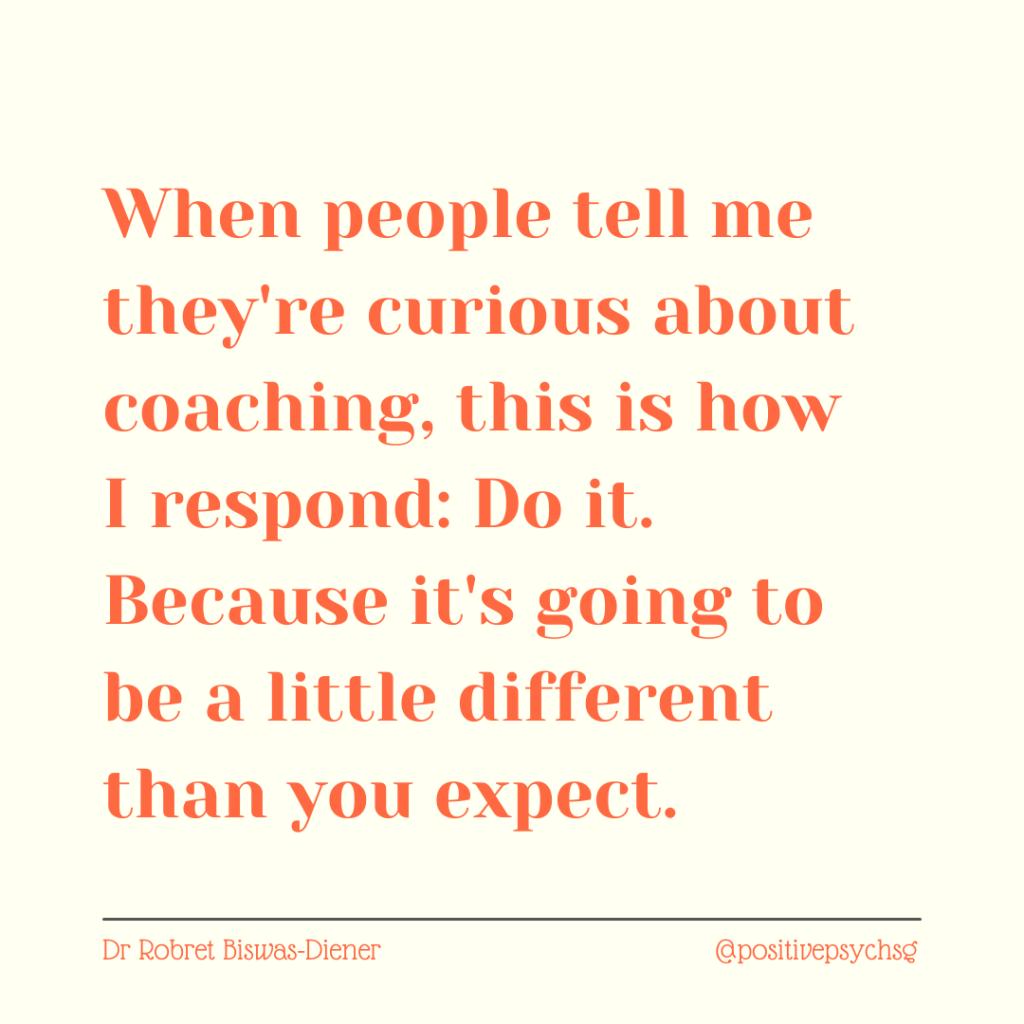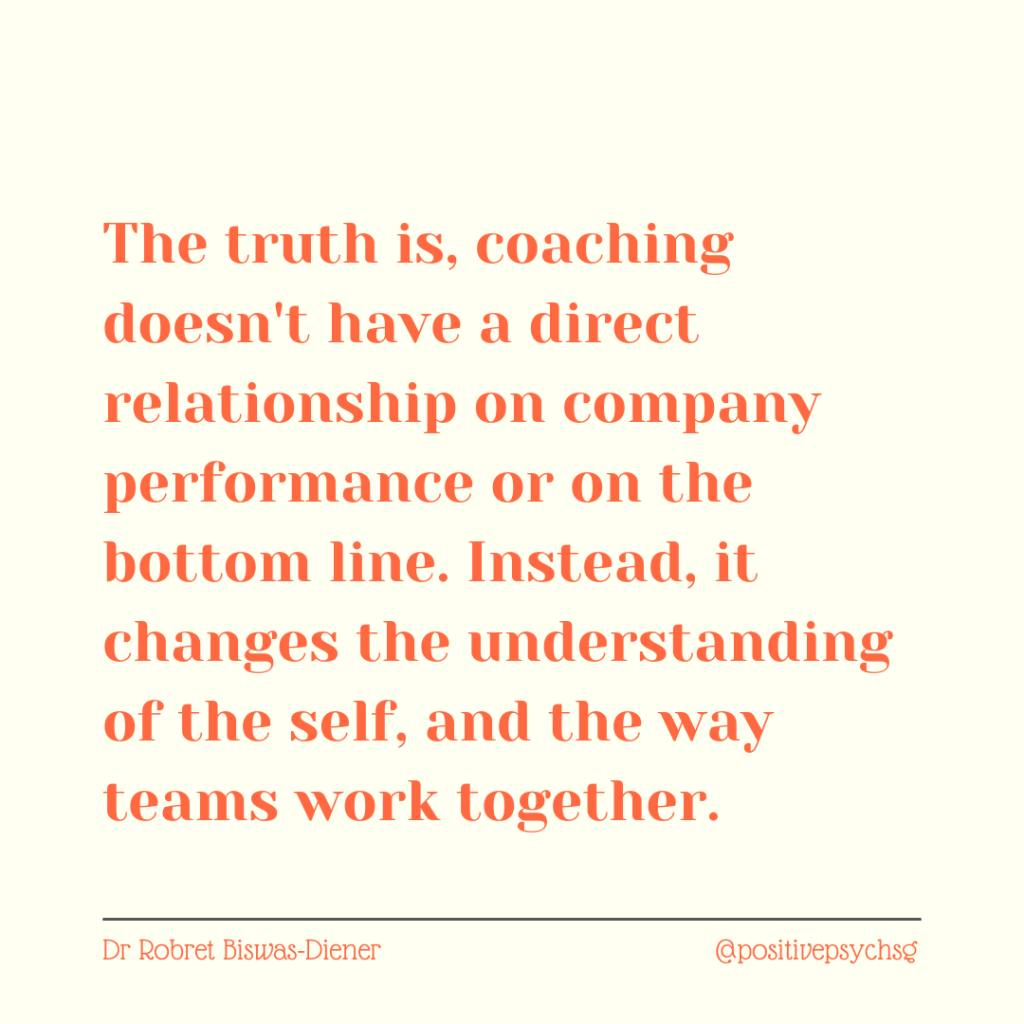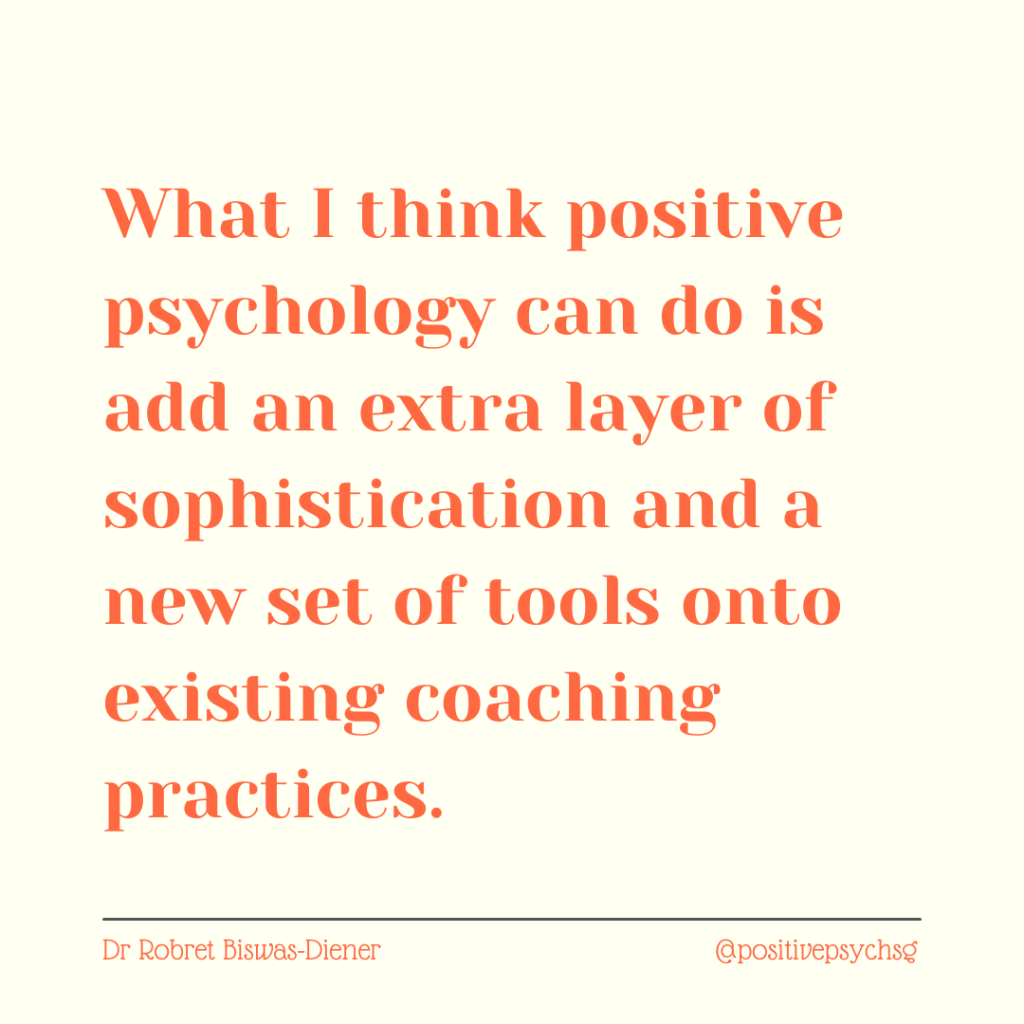Since its introduction in 2007, Positive Psychology Coaching has significantly refined and enhanced the world of coaching.
Both Positive Psychology and Coaching aim to elevate wellbeing, each exploring ways to guide individuals towards more fulfilling and successful lives. However, for a long time, they evolved along separate paths. The integration of both these fields has been a game-changer, merging the scientific rigor of positive psychology with the tailored techniques of professional coaching. This convergence offers a more holistic and evidence-based approach with practical, transformative strategies.
To better understand how Positive Psychology has been integrated into the coaching practice, we sought insights from Dr. Robert Biswas-Diener, renowned psychologist and Positive Psychology Coaching Trainer at The School of Positive Psychology. As a pivotal figure in the development of Positive Psychology Coaching, Dr. Robert offers a useful perspective on the transformative impact of bridging the science of wellbeing with coaching practice.
Before establishing yourself as a leading expert in Positive Psychology Coaching, you were devoted to investigating the concept of happiness across various cultures. What drew you to focus on happiness in particular?
I think my introduction to Happiness Studies is a little bit unique in that I inherited it. That is, both of my parents are psychologists and my father was one of the pioneers in happiness studies, so I grew up thinking that happiness was something that we can measure, something that is worth measuring and hearing about the results of these scientific studies.
When I was a teenager and then college student, I was absolutely fascinated by the idea that people around the world might experience happiness in different ways, and have different understandings and different norms around happiness. So when I graduated from college, I set about the business of becoming a happiness researcher myself.
Why do you think people should go into Positive Psychology?
Many people are skeptical of happiness studies and they think that wellbeing is frivolous. But the truth is, a mountain of research data from Positive Psychology reveals the idea that happiness isn’t just feeling good. It’s good for you.
It’s associated with being more generous with better health, with getting promoted at work, with getting pay raises, at work, with enjoying your work more. It’s widely beneficial and I would love for people to wake up to this fact that wellbeing isn’t just a four-hour programme you take on a Friday afternoon at your job. Positive Psychology, with its topics like wellbeing, motivation, curiosity, creativity makes it such an important topic that’s worth considering and even more worth learning the tools to make it an integral part of your own life.

How can the knowledge of Positive Psychology support coaching?
Coaching has existed for many decades, long before the advent of modern positive psychology. Now, I believe the science of positive psychology is a really wonderful way of knowing about the world. It uses the empirical method to collect data and to produce insights and results in which we can take a degree of confidence. We can test what we do and ultimately we can improve it. So I love the idea that science can inform coaching. It can make practice better by scrutinising the very things we do as coaches.
A perfect example of this is empathy. As psychologists, we distinguish between different aspects of empathy. For example, there is what’s called personal concern, and this is probably what you think of when you think of empathy. It is the ability to feel for a person to extend compassion to them and really to appreciate the distress that they’re experiencing. The other type of empathy is when you yourself are feeling what they are feeling.
It turns out that for coaching, you don’t need this second type of empathy. When I have a client who’s frustrated or disappointed, it does not help them at all for me to feel frustrated or disappointed as well. But it is crucial to the strength of our relationship for me to appreciate the frustration or disappointment they feel, and to communicate my concern to them.
So in some ways coaching doesn’t need positive psychology. But I definitely believe that coaching can use positive psychology. Positive psychological science takes us a step further by providing a language and framework for understanding things like empathy, strengths, how to employ them at work, how to promote more optimism so that you persevere longer, and how to enjoy better work-life balance so you are less likely to burn out.
What is one piece of advice for someone keen to explore coaching?
It’s hard to narrow down the advice that I would give to someone in just a simple sentence. But typically, when people tell me they’re curious about coaching, this is how I respond: Do it. Because it’s going to be a little different than you expect.

Most people who walk in the door of a training center think that they’re going to pick up a certificate, or a range of professional skills that they can use at work. But what happens in nearly every case is they mainly become a better person. Coaching is a conversational technology, and when you go through coach training, you learn to listen better. You learn to notice more. You learn to read others better. And it turns out that this is helpful not only in coaching work but also in every relationship you have.
Can you share examples of the impact of Positive Psychology Coaching on individuals or organizations?
One of the ways that positive psychology coaching benefits organizations is by changing the way that the people within those organizations relate to one another. A coaching culture means that people take a more positive view of their colleagues. It means that leaders take a more inquiry based approach, that they’re more likely to believe that their supervisees can solve their own problems, and they are also able to empower them to do exactly that.
Add on top of that the science of positive psychology and what you get is a culture at work that promotes wellbeing alongside performance so that you’re less likely to have people call in sick, less likely to have people quit your job, less likely to have people complain about their job. And they’re generally better organizational citizens.
How can organizations continue to have this positive psychology culture or environment to encourage job growth?
It’s often been said that changing corporate culture is a whole lot like changing the weather. It’s very difficult to do.
That said, when you get leadership buy-in for wellbeing programmes and creating a coaching culture, it has the advantage of creating a foundation of policy and support to incentivize people to act accordingly.
But you can’t just stop with leadership buy-in. You also need to train coaches and position them at all levels and roles within an organization to change the way that people are interacting with one another. One of the good things that I think came out of the pandemic is that people started taking wellbeing seriously.
It was no longer just a short training we would send people off to, but it started being something that leaders at all levels were taking seriously and thinking: how do we do this and what are the benefits of doing it? The benefits include people getting sick less. Workers stay longer and they’re generally better organizational citizens. They promote the places they work. They help their colleagues. And it’s generally a more enjoyable workplace.
How can managers or coaches inside the organisation measure the success of Positive Psychology Coaching?
How one measures the effectiveness of coaching can be a little bit difficult. It’s tempting to create metrics such as return on investment, but the truth is coaching doesn’t have a direct relationship on company performance or on the bottom line. Instead, it changes the understanding of the self, and the way teams work together. So it’s more accurate to say that coaching has an indirect influence on those metrics we care about. Typically, we can look at increased self-honesty, increased communication skills, better self-awareness as some of the metrics suggesting that coaching is working right.

What do existing or new coaches need to improve on?
One of the things that I love about coaches is that they tend to be service oriented. They want to help others and support them. They also tend to be pretty good communicators. Unfortunately, being so good at helping others and being so good at communication can lead to a certain danger – that is the danger of thinking that you have it figured out. I know a number of coaches that got to be good coaches very quickly and then they stayed good and never improved.

It’s often said that it’s easy to become a good coach and very difficult to become a great coach. And so what I think positive psychology can do is add an extra layer of sophistication and a new set of tools onto existing coaching practices, no matter what the person’s training, background or experience level is. It makes the coach come alive in their own practice and renews their skill set. Ultimately, that’s a benefit for clients.
Positive Psychology Coaching Training with Dr. Robert Biswas-Diener
It is clear that the integration of coaching with positive psychology brings a new dimension to coaching practice. Positive Psychology offers a scientific depth, and a robust framework to elevate the coaching experience.
Are you eager to master the art of coaching with the psychological science of wellbeing, or harness coaching psychology to transform your organisation or community?
Every year, Dr. Robert Biswas-Diener conducts the Positive Psychology Coaching Training at The School of Positive Psychology. This workshop is a fantastic opportunity to experience Positive Psychology Coaching in action from one of the best in the field, picking up valuable coaching skills and strategies for an effective practice.
For those looking to go deeper into positive psychology or kick-start their coaching journey, the newly offered Graduate Diploma in Coaching Psychology is the perfect next step. The carefully curated programme blends extensive theory with practical application, preparing learners for a successful career in coaching.
Need more information? Simply drop us a message and our educational consultants will be happy to offer their support.


